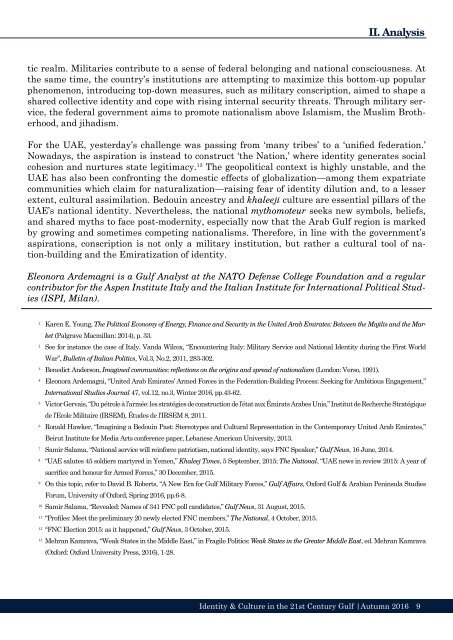Create successful ePaper yourself
Turn your PDF publications into a flip-book with our unique Google optimized e-Paper software.
II. Analysis<br />
tic realm. Militaries contribute to a sense of federal belonging and national consciousness. At<br />
the same time, the country’s institutions are attempting to maximize this bottom-up popular<br />
phenomenon, introducing top-down measures, such as military conscription, aimed to shape a<br />
shared collective identity and cope with rising internal security threats. Through military service,<br />
the federal government aims to promote nationalism above Islamism, the Muslim Brotherhood,<br />
and jihadism.<br />
For the UAE, yesterday’s challenge was passing from ‘many tribes’ to a ‘unified federation.’<br />
Nowadays, the aspiration is instead to construct ‘the Nation,’ where identity generates social<br />
cohesion and nurtures state legitimacy. 13 The geopolitical context is highly unstable, and the<br />
UAE has also been confronting the domestic effects of globalization—among them expatriate<br />
communities which claim for naturalization—raising fear of identity dilution and, to a lesser<br />
extent, cultural assimilation. Bedouin ancestry and khaleeji culture are essential pillars of the<br />
UAE’s national identity. Nevertheless, the national mythomoteur seeks new symbols, beliefs,<br />
and shared myths to face post-modernity, especially now that the Arab Gulf region is marked<br />
by growing and sometimes competing nationalisms. Therefore, in line with the government’s<br />
aspirations, conscription is not only a military institution, but rather a cultural tool of nation-building<br />
and the Emiratization of identity.<br />
Eleonora Ardemagni is a Gulf Analyst at the NATO Defense College Foundation and a regular<br />
contributor for the Aspen Institute Italy and the Italian Institute for International Political Studies<br />
(ISPI, Milan).<br />
1<br />
2<br />
3<br />
4<br />
5<br />
6<br />
7<br />
8<br />
9<br />
10<br />
11<br />
12<br />
13<br />
Karen E. Young, The Political Economy of Energy, Finance and Security in the United Arab Emirates: Between the Majilis and the Market<br />
(Palgrave Macmillan: 2014), p. 33.<br />
See for instance the case of Italy. Vanda Wilcox, “Encountering Italy: Military Service and National <strong>Identity</strong> during the First World<br />
War”, Bulletin of Italian Politics, Vol.3, No.2, 2011, 283-302.<br />
Benedict Anderson, Imagined communities: reflections on the origins and spread of nationalism (London: Verso, 1991).<br />
Eleonora Ardemagni, “United Arab Emirates’ Armed Forces in the Federation-Building Process: Seeking for Ambitious Engagement,”<br />
International Studies Journal 47, vol.12, no.3, Winter 2016, pp.43-62.<br />
Victor Gervais, “Du pétrole à l’armée: les stratégies de construction de l’état aux Émirats Arabes Unis,” Institut de Recherche Stratégique<br />
de l’Ecole Militaire (IRSEM), Études de l’IRSEM 8, 2011.<br />
Ronald Hawker, “Imagining a Bedouin Past: Stereotypes and Cultural Representation in the Contemporary United Arab Emirates,”<br />
Beirut Institute for Media Arts conference paper, Lebanese American University, 2013.<br />
Samir Salama, “National service will reinforce patriotism, national identity, says FNC Speaker,” Gulf News, 16 June, 2014.<br />
“UAE salutes 45 soldiers martyred in Yemen,” Khaleej Times, 5 September, 2015; The National, “UAE news in review 2015: A year of<br />
sacrifice and honour for Armed Forces,” 30 December, 2015.<br />
On this topic, refer to David B. Roberts, “A New Era for Gulf Military Forces,” Gulf Affairs, Oxford Gulf & Arabian Peninsula Studies<br />
Forum, University of Oxford, Spring 2016, pp.6-8.<br />
Samir Salama, “Revealed: Names of 341 FNC poll candidates,” Gulf News, 31 August, 2015.<br />
“Profiles: Meet the preliminary 20 newly elected FNC members,” The National, 4 October, 2015.<br />
“FNC Election 2015: as it happened,” Gulf News, 3 October, 2015.<br />
Mehran Kamrava, “Weak States in the Middle East,” in Fragile Politics: Weak States in the Greater Middle East, ed. Mehran Kamrava<br />
(Oxford: Oxford University Press, 2016), 1-28.<br />
<strong>Identity</strong> & <strong>Culture</strong> in the 21st Century Gulf |Autumn 2016 9


